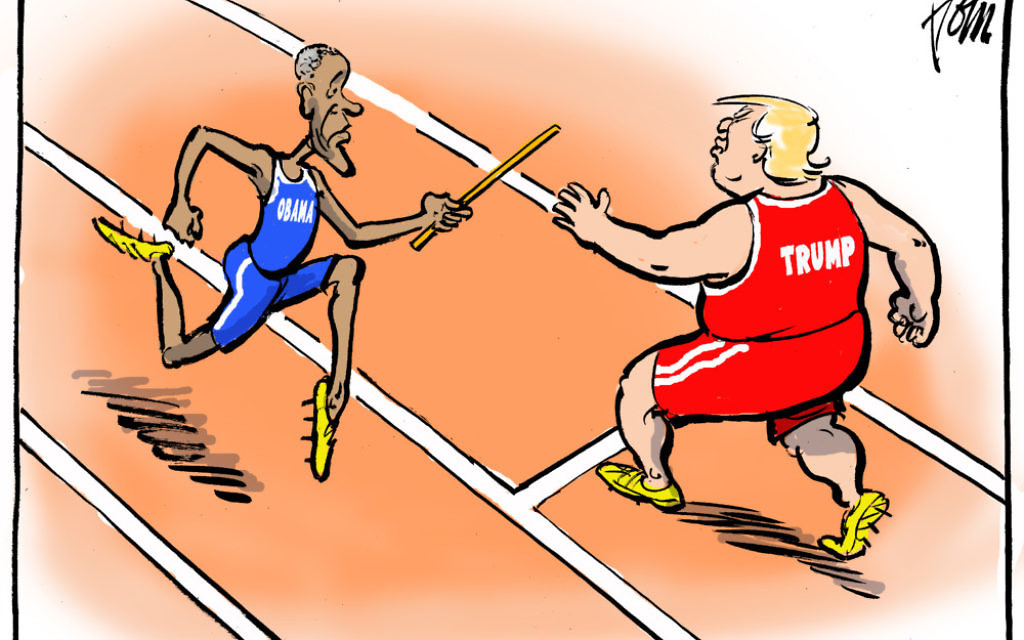Yes, With Trump, Things Will Be Different
A friend asked for my reaction to the U.S. abstention on U.N. Security Council Resolution 2334 and the speech by Secretary of State John Kerry.
The abstention was surprising, if only for the U.S. history of vetoes. The tone of the speech was as expected.
The abstention can be viewed as President Barack Obama delivering a message to Israeli Prime Minister Benjamin Netanyahu. Something like: “Our eight years of frustration with you are ending. I tell you, as a friend (and the president who backed a $38 billion, 10-year military aid plan), your status quo with the Palestinians cannot hold, no matter how politically advantageous you may find it.”
Get The AJT Newsletter by email and never miss our top stories Free Sign Up
That said, if we take Donald Trump at his word (or tweet), “things will be different” when he is sworn in Friday, Jan. 20, as the nation’s 45th president.
Trump was referring to the United Nations, but IF his campaign promises become policy, the U.S.-Israel status quo also will change.
Trump has pledged that there will be “no daylight” between the United States and Israel. He has promised to move the U.S. Embassy from Tel Aviv to Jerusalem, the seat of Israel’s government (every six months his predecessors have waived compliance with a 1995 law). His choice for ambassador to Israel has raised money for a Jewish community in the West Bank and written dismissively of the two-state plan.
U.S. policy has been that the status of Jerusalem and borders should be negotiated by Israel and the Palestinians. Israel complains that Resolution 2334 prejudges negotiations by referencing lines that existed before the 1967 Six-Day War. The resolution reiterates that Israeli settlements in the West Bank, including East Jerusalem, have “no legal validity.”
That geography includes the Jewish Quarter of the Old City and the Western Wall, the holiest site where Jewish prayer is permitted. Both were in Arab hands and inaccessible to Jews after Israel’s 1948 War of Independence until 1967.
Israel’s image in many quarters has changed since 1967, from that of a post-Holocaust nation of Jews making a desert bloom into a muscular occupier of territory seized in war.
The West Bank — religious nationalists use the biblical names of Judaea and Samaria — is home to more than 400,000 Israelis (another 180,000 live in East Jerusalem). Their backers consider the settlements, which range from collections of trailers to apartment blocs to developed suburbs, to be justifiable construction on land steeped in Jewish history.
The prevailing international stance — including U.S. policy, pre-Trump — is that the settlements and the security apparatus that protects them impede negotiations that might yield a Palestinian nation — the two-state solution, an idea that appears to be dying.
The Israeli government contends that the Palestinians favor rhetoric to negotiation, reward and glorify terrorism, promote campaigns to delegitimize Israel, and refuse to recognize Israel’s right to exist as a Jewish homeland (albeit one in which one-quarter of its citizens are not Jewish).
As for the United Nations, Israelis and many American Jews feel that the world body focuses disproportionately on Israel (whatever its faults) relative to human rights crises and offenders elsewhere in the world.
Over 40-plus years the United States has vetoed more than three dozen resolutions referring to “occupied Arab territories” and “the Palestinian question.” The United States has abstained on numerous Israel-related resolutions on other subjects. This was the first abstention under Obama of a resolution targeting Israel.
American Jews generally are of two minds about Obama. One view sees him as anti-Israel (even anti-Semitic) and his administration as bunglers in the Middle East. The other regards him as the kind of friend willing to warn Israel that its current path will not lead to the peace it wants and needs.
From where I sit, there are occasions when the perspective from Washington should differ from that in Jerusalem. But after Jan. 20, the perspective that matters most will be that of the new occupant of the Oval Office.






comments